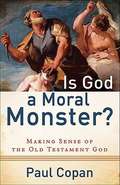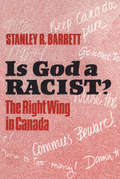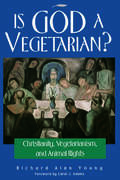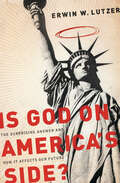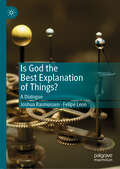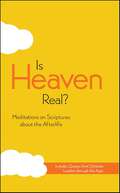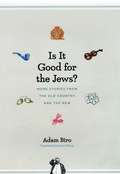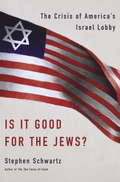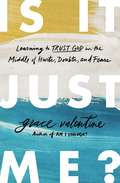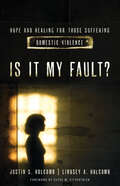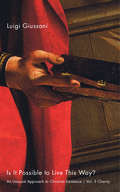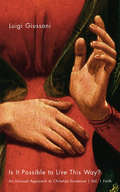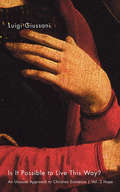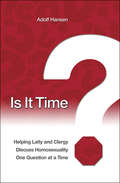- Table View
- List View
Is God Still Awake?: A Small Girl with a Big Question About God
by Sheila WalshIn this delightful full-color picture book that teaches children about prayer, bestselling author Sheila Walsh helps you show your kids how, when, and why to talk with God as they learn more of who God is and how much He loves them!Inspired by the ways God has used her book Praying Women, Sheila Walsh wanted to share her passion for prayer with kids--a passion that began when she was a little girl who wondered if God could hear her any time of the day or night.Is God Still Awake? introduces curious young readers to Poppy: a little girl who has big questions about God! Poppy wants to know how to talk with God and whether God listens to her. As she goes through her day with her cat by her side, Poppy discovers that God is always there--even when the world is asleep!With humorous, rhyming text, Is God Still Awake? assures children that God loves them and is always with them. Whether it's day or night, God is awake, He's listening, and He loves to hear His children speak!This whimsical jacketed picture book is a perfect gift for:children ages 4 to 8Christmas, baptisms, birthdayschildren beginning their faith journeygrandparents to share their faith across the milestraveling, snuggling, or bedtime reading
Is God a Moral Monster?: Making Sense of the Old Testament God
by Paul CopanA recent string of popular-level books written by the New Atheists have leveled the accusation that the God of the Old Testament is nothing but a bully, a murderer, and a cosmic child abuser. This viewpoint is even making inroads into the church. How are Christians to respond to such accusations? And how are we to reconcile the seemingly disconnected natures of God portrayed in the two testaments? In this timely and readable book, apologist Paul Copan takes on some of the most vexing accusations of our time, including: God is arrogant and jealous God punishes people too harshly God is guilty of ethnic cleansing God oppresses women God endorses slavery Christianity causes violence and more Copan not only answers God's critics, he also shows how to read both the Old and New Testaments faithfully, seeing an unchanging, righteous, and loving God in both.
Is God a Racist? The Right Wing in Canada
by Stanley R. Barrett‘God is a racist’—so goes a statement published in the literature of the Western Guard, a white-supremacist, anti-semitic group in Toronto. It is one of a number of racist organizations that have sprung up in Canada since the Second World War. Stanley Barrett points out in this disquieting study that although many of the principles of such organizations are offensive to the vast majority of Canadians, they represent a growing part of a broader political phenomenon that has recently surfaced in numerous nations. In examining the rise of right wing extremism in Canada, a nation with a traditional reputation for tolerance, Barrett considers a wide range of political convictions, from confessed fascists to essentially ordinary, law-abiding, but highly conservative individuals who are deeply concerned about the future of Western Christian civilization. Barrett’s study, grounded in a scientific tradition that has regularly exposed racial myths, is guided by humanist values that celebrate individual worth. It sheds new light on a growing phenomenon that threatens those values.
Is God a Vegetarian?
by Richard Alan YoungIs God a Vegetarian? is one of the most complete explorations of vegetarianism in the Judeo-Christian tradition. Young, a linguistics and New Testament scholar, attempts to answer the question being asked with greater and greater frequency: "Are Christians morally obligated to be vegetarians?"Many people are confused about the apparent mixed messages within the Bible. On the one hand, God prescribes a vegetarian diet in the Garden of Eden and the apocalyptic visions of Isaiah and John imply the restoration of a vegetarian diet. However, it is also clear that God permits, Jesus partakes in, and Paul sanctions the eating of flesh. Does the Bible give any clear guidance?Close readings of key biblical texts pertaining to dietary customs, vegetarianism, and animal rights make up the substance of the book. Rather than ignoring or offering a literal, twentieth-century interpretation of the passages, the author analyzes the voices of these conflicting dietary motifs within their own social contexts. Interwoven throughout these readings are discussions of contemporary issues, such as animal testing and experimentation, the fur industry, raising animals in factories, and the effects of meat-eating on human health.Thirteen chapters cover such topics as-- the vegetarian diet in the Garden of Eden-- the clothing of the first humans in animal skins-- God's permitting humans to eat meat-- animal sacrifice-- the dietary habits of Jesus and the early apostles-- Paul's condemnation of vegetarianism as heresy-- the dietary views of the early church fathers-- the peaceable kingdom.The author provides two vegetarian recipes at the end of each chapter. An epilogue includes guidelines for becoming a vegetarian and a recommended reading list.Insightful and challenging, Is God a Vegetarian? poses provocative questions for vegetarians, Christians, and anyone reflecting upon her personal choices and ethical role in our world today.
Is God on America's Side?: The Surprising Answer and How it Affects Our Future
by Erwin W. LutzerWith typical wisdom and lucidity, Erwin W. Lutzer addresses a fundamental question—a question begging for an answer after a frenetic election—"Is God really on America&’s side?" To answer, the reader is carefully led through seven vital principles of a biblical understanding of judgment.God can both bless and curse a nation. God judges nations based on the amount of light and opportunity they are given. God sometimes uses exceedingly evil nations to judge those that are less evil. When God judges a nation, the righteous suffer with the wicked. God&’s judgments take various forms. In judgment, God&’s target is often His people, not just the general population. God sometimes reverses intended judgments. Provocative questions for individual reflection or group discussion complete each chapter of the book. Throughout, Lutzer&’s insights into how Christians should view government equips them &“to think with the Bible in one hand and a newspaper in the other.&”
Is God on America's Side?: The Surprising Answer and How it Affects Our Future
by Erwin W. LutzerWith typical wisdom and lucidity, Erwin W. Lutzer addresses a fundamental question—a question begging for an answer after a frenetic election—"Is God really on America&’s side?" To answer, the reader is carefully led through seven vital principles of a biblical understanding of judgment.God can both bless and curse a nation. God judges nations based on the amount of light and opportunity they are given. God sometimes uses exceedingly evil nations to judge those that are less evil. When God judges a nation, the righteous suffer with the wicked. God&’s judgments take various forms. In judgment, God&’s target is often His people, not just the general population. God sometimes reverses intended judgments. Provocative questions for individual reflection or group discussion complete each chapter of the book. Throughout, Lutzer&’s insights into how Christians should view government equips them &“to think with the Bible in one hand and a newspaper in the other.&”
Is God the Best Explanation of Things?: A Dialogue
by Joshua Rasmussen Felipe LeonThis book provides an up to date, high-level exchange on God in a uniquely productive style. Readers witness a contemporary version of a classic debate, as two professional philosophers seek to learn from each other while making their cases for their distinct positions. In their dialogue, Joshua Rasmussen and Felipe Leon examine classical and cutting-edge arguments for and against a theistic explanation of general features of reality. The book also provides original lines of thought based on the authors’ own contributions to the field, and offers a productive and innovative inquiry into on one of the biggest questions people ask: what is the ultimate explanation of things?
Is Heaven Real?: Meditations on Scriptures about the Afterlife
by ZondervanIs Heaven Real? It seems this is an eternal question; one that is as relevant today as at any time in history. This much-debated topic has spurred untold numbers of books, blogs, discussions, and sermons – but in the end, what matters most is what the Bible says about heaven. This ebook is the place to turn to find the answer. Packed with carefully selected scripture from the popular New International Version (NIV) of the Bible, Is Heaven Real? also includes fascinating and reassuring quotations from trusted contemporary and ancient authors. Broken into sections, this ebook guides you through the big questions: What and where is heaven? What can I expect after death? What does the Bible say about the experience of this mysterious, wonderful place? So dig in, read what the Bible reveals about heaven, and spend a few minutes meditating on what it means for your life—here and now, today.
Is Heaven for Real: Suicide Driven by Faith
by Lucien Gregoire"A chilling exposé of youth suicide driven by faith." Tony Frost, Tribune Child and teen suicide is no stranger to this author: "I recall gazing at the stillness of my childhood friend in a coffin and the nun telling me that God had taken him back because he had been made of sin. He had killed himself because word got out that he had been born out of wedlock. Then there was that girl in my high school class who took the easy way out when she found herself with child. A few months after I released my biography of John Paul I, a gay teen called me and told me that my book had saved his life. He had planned to take his life on that day because his faith condemned the person he happened to be. During my years with the Children’s Home and Hospital School, I’ve shared in the grief left in the wake of children’s notes: "I have gone to live with Jesus." Thousands of mentally and physically impaired among countless others have left the same legacy behind. Then we have tragedies like Fátima, where two little children are saints today because their faith encouraged them to advance their deaths in slow and agonizing ways to suffer and die for sins of the flesh against the Immaculate Heart of Mary… and a Catholic world that thinks it wonderful. "While through the years the preacher’s hatred has taken its greatest toll in unwed mothers, gay and transgender teens, and other outcasts of religion, his lure of ‘heaven’ remains the leading cause of pre-puberty suicide today. "As for Fátima, I give you much more than the Vatican’s beatification investigation which found these children tortured themselves with abrasive ropes and stinging nettles and abstained from drinking water on hot days... "As for me, I must live out my days haunted by children’s lives snuffed out by the preacher’s irresponsible bluff, because I had not acted sooner. Thousands of tiny coffins lowered into the ground so that the preacher can sell his condominiums in the sky to sheep who lust for more." Lucien Gregoire Though the author dismantles traditional concepts of ‘heaven’ as peddled by preachers, he leaves us with far greater opportunity as he proves the salvation tenet of the 33-Day Pope: “Don’t knock yourself out over smart monkeys and Adam and Eve. Each of us is responsible for our own evolution. We can either choose to remain as mortal men, or we can evolve as Gods.”
Is Hell for Real or Does Everyone Go To Heaven?: With contributions by Timothy Keller, R. Albert Mohler Jr., J. I. Packer, and Robert Yarbrough. General editors Christopher W. Morgan and Robert A. Peterson.
by Robert A. Peterson Christopher W. MorganBoth outside and inside of the church, many people today are increasingly uncomfortable with hell. They wonder: How could it be fair to punish anyone for eternity? Will Jesus really condemn millions simply for not believing the right things about him? Isn’t God a God of love, not vengeance? The top-notch contributors to Is Hell for Real or Does Everyone Go to Heaven? tackle these and other questions with an even-handed survey of the Bible’s teaching on this difficult subject. Together, they present a careful case for upholding hell, showing that it remains central to a right understanding of God, the gospel, humanity, and God’s purposes for the world. Useful for group discussion or individual study, Is Hell for Real or Does Everyone Go to Heaven? provides an accessible introduction to the historic Christian doctrine of hell.
Is It Good for the Jews? More Stories from the Old Country and the New
by Adam Biro Catherine Tihanyi"Jewish stories," writes Adam Biro, "resemble every people's stories." Yet at the same time there is no better way to understand the soul, history, millennial suffering, or, crucially, the joys of the Jewish people than through such tales. "There's nothing," writes Biro, "more revelatory of the Jewish being." With Is It Good for the Jews? Biro offers a sequel to his acclaimed collection of stories Two Jews on a Train. Through twenty-nine tales--some new, some old, but all finely wrought and rich in humor--Biro spins stories of characters coping with the vicissitudes and reverses of daily life, while simultaneously painting a poignant portrait of a world of unassimilated Jewish life that has largely been lost to the years. From rabbis competing to see who is the most humble, to the father who uses suicide threats to pressure his children into visiting, to three men berated by the Almighty himself for playing poker, Biro populates his stories with memorable characters and absurd--yet familiar--situations, all related with a dry wit and spry prose style redolent of the long tradition of Jewish storytelling. A collection simultaneously of foibles and fables, adversity and affection, Is It Good for the Jews? reminds us that if in the beginning was the word, then we can surely be forgiven for expecting a punch line to follow one of these days.
Is It Good for the Jews? The Crisis of America's Israel Lobby
by Stephen SchwartzIn 2005, two then-officials of the American Israel Public Affairs Committee were indicted for handing over classified information to a foreign power. That the power in question was assumed to be Israel brought fresh credibility to a conspiracy theory that had been floating around Washington for years: that a powerful "Jewish lobby" controls U.S. policy in the Middle East. The run-up to the Iraq war had provided new grist for this theory. A group of largely Jewish neoconservatives were among the architects of the war, and their motivations for removing Saddam Hussein were alternately ascribed to oil interests and the need to protect Israel. The allegations against these neoconservatives--especially former Deputy Secretary of Defense Paul Wolfowitz--echoed the case of the notorious Jonathan Pollard who pleaded guilty of spying for Israel in 1986. In this biting and incisive polemic, journalist and author Stephen Schwartz confronts the myth of a Jewish lobby head on, asking questions that no one else has dared to pose. What is the "Jewish lobby"? How powerful is it? What was its involvement in the preparations for war in Iraq? Was there really a "cabal" of neoconservative Jews in the administration of George W. Bush? How did AIPAC officials come to be accused, in 2004, of espionage? Above all, what is good for the Jews, and who decides it? Many of us forget that in the 1930s, a genuine home-grown fascist movement arose in America. At that time, Schwartz reminds us, it was not the official representatives of the Jewish community that stood up to the fascist goons of New York City, but Jewish socialists--the antecedents of today's neoconservatives. Likewise, today, it has not been the meek and timid leaders of the supposedly all-powerful Jewish Lobby that have defended the Jews but the reviled "neocons" in the Bush Administration. Their strategic vision projects a foreign policy that is both good for America and good for the Jews. As a result, Schwartz predicts an increasing turn for Jewish voters away from their dysfunctional marriage with the Democratic Party and toward the Republicans. Ultimately Schwartz concludes that in today's America, a "Jewish lobby" may no longer be necessary. In the face of the threatened collapse of the Lobby, he argues, American Jews should openly and proudly assume their proper role as moral and religious exemplars for their fellow Americans and cease acting like a frightened minority.
Is It Hanukkah Yet?
by Alessandra Psacharopulo Chris BarashChris Barash is the author of Is It Passover Yet? She is an elementary school teacher and lives in the Berkshires of western Massachusetts, where she always looks forward to lighting the candles of Hanukkah with friends and family. Alessandra Psacharopulo lives and works in Milan. She studied fine arts and illustration at Mimaster, where she learned painting and using color.
Is It Just Me?: Learning to Trust God in the Middle of Hurts, Doubts, and Fears
by Grace Elaine ValentineIs It Just Me? is a book by a popular social media blogger that helps young women find true trust in Jesus when they are overwhelmed and frustrated with their lives. Many women joke about having trust issues—laughing at their struggle because it feels common but secretly feeling there is no hope. Grace Valentine was one of them. In her twenties she realized her trust issues were not humorous because in reality hers were trust issues with Jesus, her community, her family, and herself. And they were destroying her faith. Grace creatively told herself she was simply being realistic, but the truth was, she was entangled with doubt and lies. In Grace&’s second book, Is It Just Me?, she offers readers a new perspective by helping them find answers to five deeply felt questions. Am I the only one who is tired, overwhelmed, doubting, and fearful?Am I the only one who feels hurt and lonely?Am I the only one who still is struggling to find my purpose?Am I the only one struggling to trust that God is there?Am I the only one confused about how to be an adult?Grace&’s personal story and perceptive insights show other young women that not only are they are not alone, they can trust God in the middle of their hurts, doubts, and fears.
Is It Me or My Meds: Living with Antidepressants
by David A. KarpThis book gives voice to those who are depressed and to those who use medications so that they are not depressed. Full of useful information.
Is It My Fault?: Hope and Healing for Those Suffering Domestic Violence.
by Justin S. Holcomb Lindsey A. HolcombIs it My Fault? proclaims the gospel of healing and hope to victims who know too well the depths of destruction and the overwhelming reality of domestic violence. At least one in every three women have been beaten, coerced into sex, or abused in their lifetime. The effects of domestic violence are physical, social, emotional, psychological, and spiritual, and can have long-lasting distressing consequences. It is common for victims of domestic violence to suffer from ongoing depression and recurring nightmares, self-harm, such as cutting, panic attacks, substance abuse, and more. This book exists to address the abysmal issues of domestic violence using the powerful and transforming biblical message of grace and redemption. Is It My Fault? convincingly shows that the Lord is the only one who can heal the despairing victim. It deals with this devastating problem and sin honestly and directly without hiding its prevalence today.
Is It My Fault?: Hope and Healing for Those Suffering Domestic Violence.
by Justin S. Holcomb Lindsey A. HolcombIs it My Fault? proclaims the gospel of healing and hope to victims who know too well the depths of destruction and the overwhelming reality of domestic violence. At least one in every three women have been beaten, coerced into sex, or abused in their lifetime. The effects of domestic violence are physical, social, emotional, psychological, and spiritual, and can have long-lasting distressing consequences. It is common for victims of domestic violence to suffer from ongoing depression and recurring nightmares, self-harm, such as cutting, panic attacks, substance abuse, and more. This book exists to address the abysmal issues of domestic violence using the powerful and transforming biblical message of grace and redemption. Is It My Fault? convincingly shows that the Lord is the only one who can heal the despairing victim. It deals with this devastating problem and sin honestly and directly without hiding its prevalence today.
Is It Night or Day?
by Fern Schumer ChapmanIn 1938, Edith Westerfeld, a young German Jew, is sent by her parents to Chicago, Illinois, where she lives with an aunt and uncle and tries to assimilate into American culture, while worrying about her parents and mourning the loss of everything she has ever known. Based on the author's mother's experience, includes an afterword about a little-known program that brought twelve hundred Jewish children to safety during World War II.
Is It Possible To Live This Way?
by Luigi Giussani John ZucchiThis volume of Is It Possible to Live this Way, a translation of Luigi Giussani's Si Può Vivere Così?, addresses the virtue of charity. A compilation of Giussani's conversations with young people who have chosen the path of the consecrated life in the Church - that is, have chosen to live their lives in the world according to the "evangelical counsels" of poverty, chastity, and obedience - it proposes an unusual yet reasonable approach to living as a Christian. As in all his works, Giussani encourages young people to be serious about their own existence and loyal to their experience. The conversations reported here are fascinating and insightful, providing support for a way of life that today is frequently questioned, rejected, or censured.
Is It Possible To Live This Way?
by Luigi GiussaniAs in all his works, Giussani encourages young people to be serious about their own existence and loyal to their experience. The conversations reported here are fascinating and insightful, providing support for a way of life that today is frequently questioned, rejected, or censured.
Is It Possible To Live This Way?
by Luigi GiussaniIs It Possible to Live this Way, a translation of the first part of Luigi Giussani's Si Può Vivere Così?, addresses the virtue of hope. A compilation of Giussani's conversations with young people who have chosen the path of the consecrated life in the Church - that is, have chosen to live their lives in the world according to the "evangelical counsels" of poverty, chastity, and obedience - it proposes an unusual yet reasonable approach to living as a Christian. As in all his works, Giussani encourages young people to be serious about their own existence and loyal to their experience. The conversations reported here are fascinating and insightful, providing support for a way of life that today is frequently questioned, rejected, or censured.
Is It Possible To Live This Way?: An Unusual Approach to Christian Existence: Charity
by Luigi Giussani John ZucchiThis volume of Is It Possible to Live this Way, a translation of Luigi Giussani's Si Può Vivere Così?, addresses the virtue of charity. A compilation of Giussani's conversations with young people who have chosen the path of the consecrated life in the Church - that is, have chosen to live their lives in the world according to the "evangelical counsels" of poverty, chastity, and obedience - it proposes an unusual yet reasonable approach to living as a Christian. As in all his works, Giussani encourages young people to be serious about their own existence and loyal to their experience. The conversations reported here are fascinating and insightful, providing support for a way of life that today is frequently questioned, rejected, or censured.
Is It Possible To Live This Way?: An Unusual Approach to Christian Existence: Faith
by Luigi GiussaniAs in all his works, Giussani encourages young people to be serious about their own existence and loyal to their experience. The conversations reported here are fascinating and insightful, providing support for a way of life that today is frequently questioned, rejected, or censured.
Is It Possible To Live This Way?: An Unusual Approach to Christian Existence: Hope
by Luigi GiussaniIs It Possible to Live this Way, a translation of the first part of Luigi Giussani's Si Può Vivere Così?, addresses the virtue of hope. A compilation of Giussani's conversations with young people who have chosen the path of the consecrated life in the Church - that is, have chosen to live their lives in the world according to the "evangelical counsels" of poverty, chastity, and obedience - it proposes an unusual yet reasonable approach to living as a Christian. As in all his works, Giussani encourages young people to be serious about their own existence and loyal to their experience. The conversations reported here are fascinating and insightful, providing support for a way of life that today is frequently questioned, rejected, or censured.
Is It Time?: Helping Laity and Clergy Discuss Homosexuality One Question at a Time
by Adolf HansenConversations about human sexuality are taking place all over The United Methodist Church--in local congregations, among leaders, and in conferences. Adolf Hansen, an ordained elder who is theologian-in-residence at St. Luke’s UMC, Indianapolis, contributes to this conversation by presenting questions for laity and clergy to explore as they engage in open dialogue in an atmosphere of mutual respect, even when the conversation partners disagree. The author says, "My hope is that persons who read this book will become aware of the wide variety of issues related to the subject of homosexuality; will be encouraged to reflect on each of them; will think through the meaning of whatever answers they give to the questions the book raises; will grapple with the implications of the stances they take; and will engage in conversations with others—both in a one-on-one setting and in a group." (from the Introduction)When we do that, he argues, we can move on to the wider issues and give our full attention to the mission of the Church: to make disciples of Jesus Christ for the transformation of the world. From the Faultlines collection, resources intended to inform conversations around human sexuality and the church.

